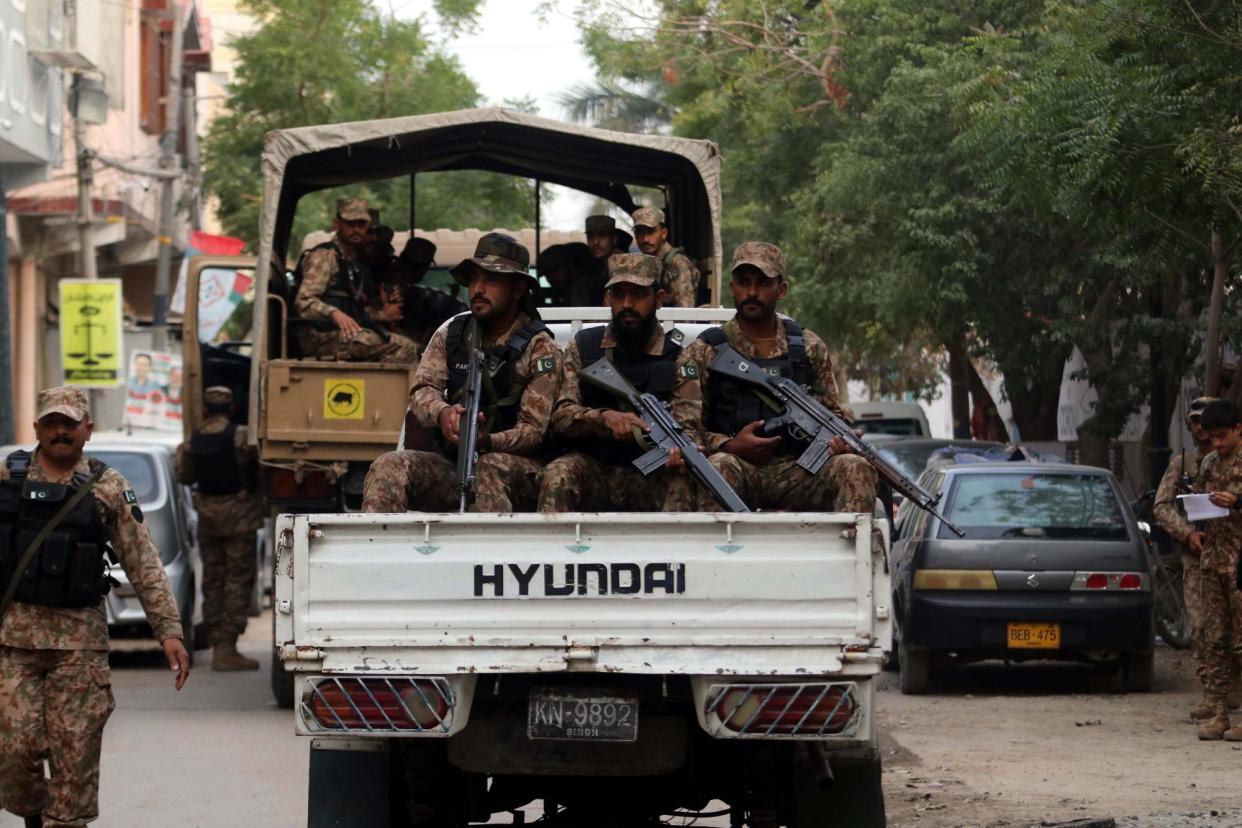Pakistan election: phone service suspended as country goes to polls

Phone services have been suspended in Pakistan as the country voted in a general election marred by allegations of vote rigging and militant attacks.
The caretaker government said phone services, including mobile internet, had been suspended on Thursday for security reasons, after two two bomb blasts by Islamic State targeted election offices in the restive region of Balochistan on the eve of the polls.
However, political parties and candidates voiced concern that the suspension was a strategy to enable the rigging of the election by Pakistan’s powerful military, which has a history of meddling in the polls.
Results had been expected by the evening but the suspension caused a delay in the reporting of votes, adding to concerns about the integrity of the process.
Amnesty International decried the suspension as a “reckless attack on people’s rights” while Mustafa Nawaz Khokhar, who was running as an independent candidate in Islamabad, said on X: “Shutting down mobile networks on polling day is the beginning of election day rigging.”
“The pre-poll environment was already one of the worst in Pakistan’s history. Cutting candidates off from their agents and staff on election day is unacceptable,” said Khokhar.
Early indicators, with around 20% of the votes counted – largely from urban areas – showed a surprise lead for the Pakistan Tehreek-e-Insaf (PTI), the political party of the former prime minister Imran Khan, who is currently in jail.
According to PTI spokesperson, Sayed Zulfikar Bukhari, the party had an early lead in 114 out of 270 constituencies, giving it a significant majority over other parties. However, he voiced concerns of rigging and alleged that the vote counting in some places had “slowed or stopped entirely to change results”.
Other candidates told the Guardian that the polling agents had been stopped from collecting votes from the polling stations.
Many analysts had seen the election as a foregone conclusion for the return of three-time prime minister Nawaz Sharif and his Pakistan Muslim League-Nawaz (PML-N) party after he allegedly struck a deal with the military – widely seen as the power brokers of Pakistan – and had their tacit backing to return to power.
Sources told the Guardian that Sharif had already written his victory speech, which he had been due to give at the party headquarters in Lahore at 7pm, but it was cancelled as the initial results began to come in.
The military had also done everything to sideline Khan and his PTI party from politics in what many saw as a clear bid to keep them from returning to power, after Khan had a dramatic fallout with senior army leaders and was toppled from power in 2022.
Khan has been in jail since August and was unable to contest the election. Last week he was given three separate court sentences that would put him behind bars for more than a decade in cases he alleged were politically motivated.
His PTI party was subjected to a lengthy crackdown in the run-up to the vote, preventing its candidates from being able to contest freely. PTI leaders had alleged that the suspension of mobile services was an attempt to prevent high voter turnout, which was widely seen to benefit PTI.
Given the strength of the military’s campaign against Khan, few had expected his party to be allowed to return to power as a result of Thursday’s election.
Nonetheless, in polling stations across Islamabad, the mood was overwhelmingly for PTI and Khan, despite his incarceration.
Feroza Rasheed Qureshi, 73, said she could barely walk but had forced her children to carry her to the polling station so she could vote for PTI. “We are tired of Sharifs and Bhuttos,” she said. “What happened to Imran Khan was very wrong, the army is behind the fake cases against him and crackdown on his party.”
More than 128 million people were registered to vote, including 20 million first-time voters who widely appeared to throw their support behind Khan, even as they expressed doubts that the election would be free or fair.
“My whole generation is standing with Imran Khan and supporting him,” said Areesha Khan, 19. “Maybe the result is already decided but we still have be to optimistic that our vote will count and things will change.”
Related: ‘Harassed constantly’: Imran Khan’s party fights state pressure in Pakistan election
The security situation in the country remained precarious as elections took place. More than 650,000 security personnel were deployed across Pakistan on election day, with particularly large numbers in the provinces of Balochistan and Khyber Pakhtunkhwa, which have been the worst hit by rising militant attacks.
On Thursday, five police officers died in a bomb blast in the Kulachi area of Dera Ismail Khan district in Khyber Pakhtunkhwa and one person was killed when gunmen opened fire on a security forces vehicle in Tank, about 25 miles to the north.
In Balochistan, a soldier from a civilian force was killed and 10 others injured in more than a dozen blasts caused by grenades or improvised explosive devices, officials said, while two children died in a blast outside a women’s polling station.

 Yahoo News
Yahoo News 
